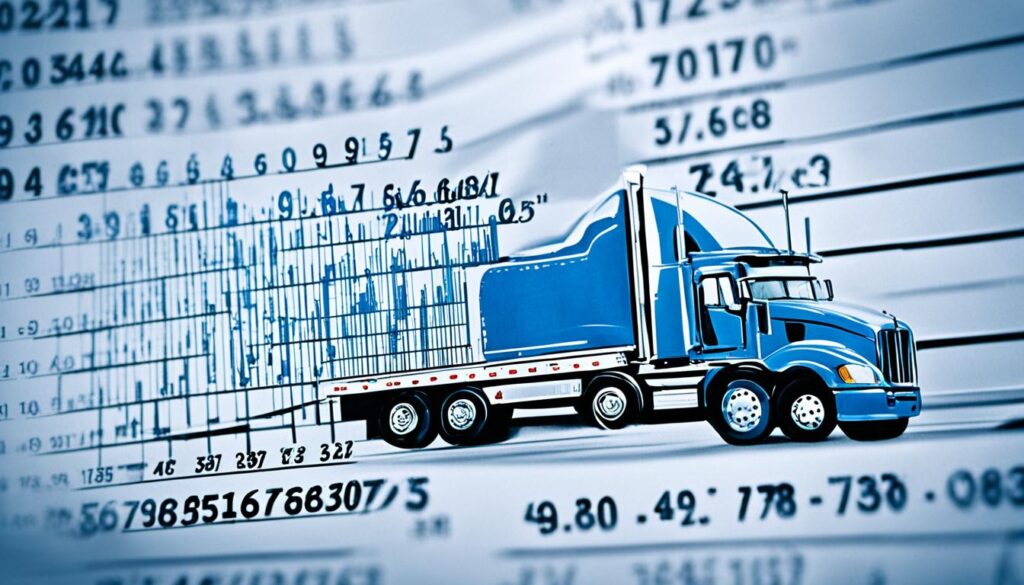Selling a trucking business can be a complex process, but with careful planning and strategic execution, you can maximize profits and ensure a successful sale. Whether you’re looking to retire or transition into a new venture, understanding the key factors that make a truckage business attractive to buyers is crucial. By taking steps to increase its company value and working with a trusted business broker or M&A advisor, you can navigate the sale process with confidence.
Key Takeaways:
- Understand the factors that increase the value of a truckage business, such as minimizing liability, having a larger geographic reach, retaining good employees, making capital investments, leveraging technology, building brand awareness, and having positive financial trends.
- Consider important business valuation metrics like EBITDA, cash flows, and trend analysis of financial statements when determining the value of your truckage business.
- Follow the business sale process, including creating marketing materials, identifying prospective buyers, conducting due diligence, negotiating the final price and terms, and finalizing the sale with the required legal documents.
- Partner with a professional broker who specializes in the trucking industry to navigate the sale process and enhance your chances of finding qualified buyers.
- Target a broad market, both locally and nationally, to increase your chances of finding the right buyer for your business.
Factors that Increase the Value of a Trucking Business.
When it comes to selling a trucking or logistics company, maximizing its value is key to attracting prospective buyers and achieving a successful sale. There are several factors that increase the value of a business and make it more appealing to investors and buyers alike.
- Minimizing liability: Reducing accidents and shipping mistakes is crucial in minimizing legal and financial risks. A track record of safety and a proactive approach to risk management can significantly increase the value of a truckage business.
- Geographic reach: Having a larger geographic footprint allows for potential growth opportunities. A business with a well-established network and the ability to serve a wider customer base is more valuable in the eyes of prospective buyers.
- Talented workforce: Retaining good employees who are committed to following safety rules and maintaining high standards adds value to a truckage business. A skilled and reliable workforce is an asset that contributes to the overall stability and success of the company.
- Fleet maintenance: Making capital investments to maintain a fleet of trucks in optimal condition is essential. A well-maintained fleet not only ensures smooth operations but also demonstrates a commitment to reliability and professionalism, thereby increasing the value of the business.
- Technological integration: Embracing technology and leveraging it for operational efficiency is crucial in today’s trucking industry. The seamless integration of software and systems improves productivity, reduces costs, and enhances customer satisfaction, all of which contribute to the value of the business.
- Brand reputation: Building brand awareness and a positive reputation within the industry can significantly increase the value of a truckage. A strong brand with a loyal customer base and recurring revenue streams is highly attractive to buyers.
- Financial performance: Positive financial trends, such as consistent growth, profitability, and healthy cash flows, are important indicators of a truckage business’s value. Buyers are interested in companies with a solid financial foundation and the potential for long-term profitability.
By considering these factors and strategically addressing them, trucking business owners can enhance the value of their company and position it for a successful sale.
“Investing in safety, maintaining a reliable fleet, and embracing technology to improve efficiency are just a few examples of how business owners can increase the value of their company and attract prospective buyers.”
Metrics Used for Business Valuations in the Trucking Industry.
When it comes to valuing a truckage business, there are several important metrics that are commonly used. Market value is determined by considering the income generated by assets, calculating worth based on different financial figures, and factoring in the fair value for tax and financial planning purposes. Understanding these metrics and their impact on the valuation process is essential for business owners preparing to sell.
- EBITDA (Earnings Before Interest, Taxes, Depreciation, and Amortization): This metric measures a company’s operating performance by excluding non-operational expenses and income. Buyers often focus on EBITDA as it provides a clear picture of the business’s profitability and cash-generating capability.
- Cash Flows: Cash flows are another crucial metric used in business valuations. Buyers are interested in trucking companies that generate consistent and positive cash flows, ensuring the sustainability of operations and the ability to meet financial obligations.
- Trend Analysis: Analyzing the company’s financial statements over time helps identify trends in revenues, expenses, and profitability. Positive trends indicate a healthy and growing business, making it more attractive to buyers.
By evaluating these metrics, buyers can gain valuable insights into a business’s financial performance, stability, and growth potential. As a business owner looking to sell, having a clear understanding of these metrics allows you to showcase the strengths of your business and negotiate a fair valuation.
“Understanding the key metrics used in business valuations is crucial when preparing to sell and maximizing the value of your business.“

| Valuation Metric | Description |
|---|---|
| EBITDA | Earnings Before Interest, Taxes, Depreciation, and Amortization |
| Cash Flows | Consistent and positive cash inflows and outflows |
| Trend Analysis | Analysis of financial statements over time to identify trends |
The Business Sale Process for a Trucking Company.
Selling a transportation company involves a multi-step process that requires careful planning and execution. A successful business sale includes determining the value of the company, preparing financial documents, increasing sellability, marketing to prospective buyers, negotiating sales terms, participating in due diligence, finalizing the sale, and ensuring a smooth transition. By following the right steps, you can maximize the value of your business and ensure a successful sale. In this section, we will outline the key stages of the trucking company sale process and provide insights on how to navigate each step effectively.
Step 1: Create Compelling Marketing Materials
Before you begin the sale process, it’s essential to create attractive marketing materials that effectively showcase your trucking business. These materials should highlight the unique selling points, such as your extensive fleet, strong customer relationships, and efficient operational capabilities. Including a comprehensive overview of your financial performance and industry reputation can also help attract potential buyers.
Step 2: Identify and Evaluate Potential Buyers
Once your marketing materials are ready, it’s time to identify and evaluate interested buyers. This involves conducting market research to find strategic buyers with a genuine interest in the trucking industry. Additionally, compiling a list of financial buyers, such as private equity firms or other trucking companies, can expand your pool of potential buyers. Evaluate each buyer’s credibility, financial capability, and alignment with your business goals before engaging in further discussions.
Step 3: Conduct Due Diligence
Due diligence is a crucial step in the sale process where potential buyers review your financial statements, contracts, and other relevant documents. Providing accurate and transparent information during this stage is essential for maintaining buyer confidence and trust. Be prepared to answer any questions regarding your operations, legal compliance, and customer relationships. Working with experienced advisors can help streamline the due diligence process and ensure compliance with legal requirements.
Step 4: Negotiate the Final Price and Terms
Once you have identified a qualified buyer and completed the due diligence process, it’s time to negotiate the final price and terms of the sale. This includes discussions around the purchase price, payment terms, and any contingencies or warranties that need to be included in the agreement. It is crucial to strike a balance between maximizing the value of your business and meeting the buyer’s expectations to facilitate a smooth transaction.
Step 5: Finalize the Sale and Legal Documentation
After reaching an agreement on the price and terms, the next step is to finalize the sale with the required legal documentation. This may involve drafting a purchase agreement, transfer of assets, and other legal documents necessary to transfer ownership. Collaborating with experienced legal counsel ensures all necessary paperwork is completed accurately and efficiently.
By following these essential steps and working with trusted professionals, you can navigate the sale process for your trucking company successfully. Each stage requires careful attention to detail and strategic decision-making in order to achieve an optimal outcome.
| Step | Description |
|---|---|
| Step 1 | Create Compelling Marketing Materials |
| Step 2 | Identify and Evaluate Potential Buyers |
| Step 3 | Conduct Due Diligence |
| Step 4 | Negotiate the Final Price and Terms |
| Step 5 | Finalize the Sale and Legal Documentation |
Successfully selling a transportation company requires careful planning, effective marketing, thorough due diligence, and skilled negotiation. By following these steps and seeking professional guidance, you can navigate the sale process with confidence and achieve a successful outcome.
Partnering with a Trucking Business Broker.
When selling a trucking and logistics business, it is beneficial to partner with a professional broker who specializes in the trucking industry. A broker can provide valuable guidance and expertise throughout the entire sales process, including valuing the business, preparing for the sale, identifying potential buyers, negotiating the terms, and managing the paperwork and legal aspects of the transaction. Their industry knowledge and network can greatly enhance the chances of finding qualified buyers and achieving a successful sale.
Business brokers have a deep understanding of the trucking industry, market trends, and the unique challenges and opportunities that business owners face. They have a network of potential buyers who are actively looking to invest in or acquire trucking companies, ensuring that your business reaches a targeted and qualified audience.
Working with a trucking broker allows you to leverage their experience and expertise in valuing your business. They will assess various factors such as your company’s financial performance, market position, customer base, and growth potential to determine an accurate valuation. This helps in setting an appropriate asking price that attracts serious buyers while maximizing your profits.
Moreover, a broker takes on the task of marketing your business to potential buyers. They prepare comprehensive marketing materials, including confidential business profiles and compelling presentations, to highlight the strengths and value of your truckage company. This ensures that your business is presented in the best possible light and attracts the attention of qualified buyers.
A trucking business broker’s expertise in managing confidential information is vital during the sale process. They have systems in place to protect sensitive information and ensure that only qualified and serious buyers have access to it.
Throughout the negotiation process, a business broker acts as a mediator, representing your interests and ensuring that the deal terms are fair and favorable. They have a deep understanding of the legal and financial aspects of business transactions and can navigate complex agreements and contracts with ease.
By partnering with a broker, you can save valuable time and resources, allowing you to focus on running your business while the broker handles the intricacies of the sale process. Their expertise and guidance streamline the transaction, increasing the likelihood of a successful sale at the optimal price.
In summary, partnering with a trucking broker who specializes in the industry provides numerous benefits when selling your business. Their industry knowledge, network, and expertise in valuing, marketing, and negotiating ensure that your business is positioned for a smooth and profitable sale. Working with a reputable broker is a strategic decision that can maximize the value of your business and deliver a successful outcome.
Selling a Trucking Business Nationwide.
When it comes to selling a trucking business or a transportation company, it’s crucial to consider potential buyers at both the local and national levels. By expanding your target market beyond the local area, you can tap into a broader pool of potential buyers who may be interested in acquiring a trucking company to expand their own operations or gain a competitive advantage.
Trucking businesses have the advantage of having a wide geographic reach, allowing them to serve clients from various regions and industries. This diversity can make your business attractive to buyers who are looking for opportunities to grow and diversify their customer base.
“Buyers from various regions and industries may be interested in acquiring a truckage company to expand their operations or gain a competitive advantage.“
Expanding your reach nationally not only increases your chances of finding the right buyer but also helps position your business as a leader in the industry. By targeting a broad market, you can showcase the value and potential of your business to a wider audience.
Partnering with a broker who specializes in the trucking industry can be highly beneficial in selling your business nationally. A broker has the expertise and network to connect you with prospective buyers from different regions, increasing your chances of finding a buyer who aligns with your business goals.
| Benefits of Selling a Trucking Business Nationwide | Diverse customer base | Expanded market potential | Competitive advantage |
|---|---|---|---|
| 1 | Tap into new customer segments and industries | Target markets with high demand for trucking services | Stay ahead of local competitors |
| 2 | Opportunity for growth and scalability | Access to larger contracts and long-term partnerships | Attract buyers seeking strategic acquisitions |
| 3 | Increased brand awareness and reputation | Establish your business as a national player | Showcase expertise and industry leadership |
By strategically positioning your truckage for national sale, you can broaden your opportunities and attract buyers who are actively seeking acquisitions in the industry. Taking advantage of the expertise offered by a broker and utilizing targeted marketing strategies will help you find the right buyer and achieve a successful sale of your truckage business.
Valuing a Trucking Company and Determining an Asking Price.
When selling a truckage company, one of the crucial steps is to determine its value accurately. Valuation involves a comprehensive assessment of various factors, including financial performance, market trends, industry benchmarks, and growth potential. By considering these key elements, sellers can establish a reasonable asking price that reflects the true worth of their business.
Understanding the logistics industry benchmarks and trends is essential in the valuation process, as it provides a context for comparing the trucking company against industry standards.
Several methods can be used to determine the value of a trucking company. One commonly employed approach is the consideration of EBITDA multiples, which measure the company’s earnings before interest, taxes, depreciation, and amortization. This method provides a clear indication of the business’s financial performance and profitability.
Additionally, cash flow analysis is another valuable tool for valuing a trucking company. By scrutinizing the cash flow generation and its sustainability, prospective buyers can assess the company’s liquidity and ability to meet financial obligations.
Trend analysis of financial statements is also integral to the valuation process. By examining the company’s historical financial performance and identifying patterns, buyers gain insights into its stability, growth trajectory, and potential for future profitability.
To ensure an accurate business valuation and appropriate asking price, it is highly recommended to work with a broker or M&A advisor who specializes in the trucking industry. These professionals have extensive knowledge of market trends, industry benchmarks, and valuation methodologies specific to the trucking sector. Their expertise can provide sellers with a comprehensive assessment and invaluable guidance throughout the process.
| Valuation Methods | Description |
|---|---|
| EBITDA Multiples | Calculating the value based on the company’s earnings before interest, taxes, depreciation, and amortization. |
| Cash Flow Analysis | Evaluating the cash flow generation and its sustainability to assess the company’s financial stability. |
| Trend Analysis of Financial Statements | Examining historical financial performance to identify patterns and evaluate the potential for future growth. |
Working with a Trusted Business Broker
In collaboration with a trusted broker or M&A advisor, sellers can navigate the complex process of valuing a trucking and logistics company. These professionals possess the industry knowledge and experience to accurately evaluate a business’s worth, provide insights into market trends, and guide sellers in determining an appropriate asking price.
“Working with a business broker who specializes in the trucking industry can significantly assist sellers in determining an accurate asking price and maximizing the value of their company.”
Overall, the process of valuing a trucking company and determining an asking price requires a thorough analysis of financial factors, industry benchmarks, and market trends. By leveraging the expertise of a broker or M&A advisor, sellers can confidently navigate the valuation process, set a realistic asking price, and enhance their chances of a successful sale.
Conclusion
Successfully selling a business requires a well-planned strategy and careful execution. By understanding the factors that increase the value of your business, you can position it for a lucrative sale. It is crucial to partner with a reputable broker who can provide valuable guidance throughout the entire selling process.
In order to attract nationwide buyers, it is important to have a wide geographic reach and a diverse client base. This will make your business more appealing to prospective buyers who are looking to expand their operations or gain a competitive advantage. By targeting a broad market and utilizing the expertise of a broker, you can increase your chances of finding the right buyer for your business.
Valuing your trucking company accurately is essential when determining an asking price. Working with a broker who specializes in trucking industry valuations can help ensure an accurate assessment and assist in setting an appropriate asking price. Additionally, starting early and preparing your business for sale, along with seeking professional guidance, will help you navigate the sale process smoothly and achieve a successful outcome.
In conclusion, selling a trucking business can be a profitable venture if approached strategically. By considering the value factors, partnering with a broker, targeting nationwide buyers, understanding the valuation process, and seeking professional guidance, you can maximize profits and ensure a seamless transition. Start planning early and take the necessary steps to position your trucking business for a successful sale.



